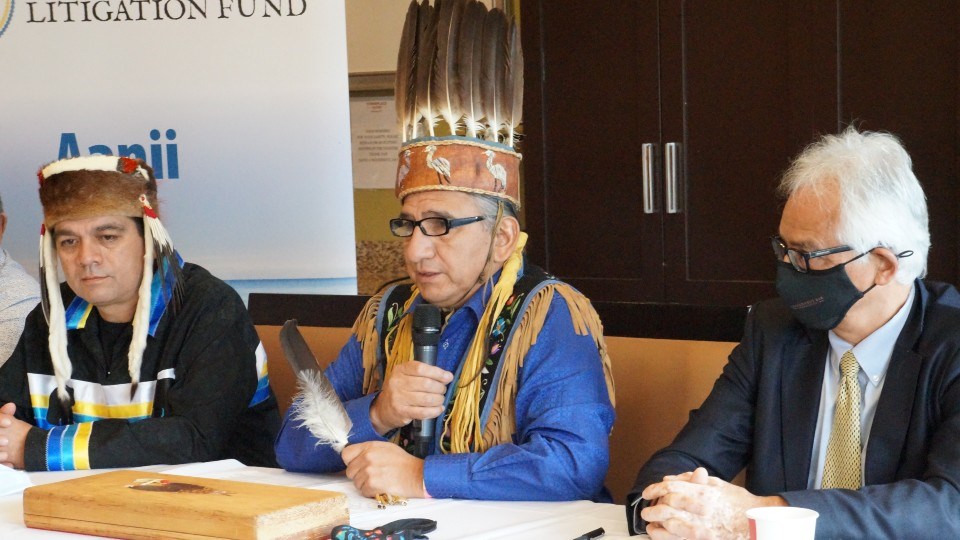In a fitting end to Treaty Week, the Ontario Court of Appeal released its decision in the Restoule v. Canada (Attorney General) & Ontario (Attorney General) case, deciding in favour of the 21 signatories of the Robinson Huron Treaty of 1850, and affirming a majority of the trial decisions that the Ontario government had been appealing.
It was a move that Chief Dean Sayers of signatory nation Batchewana First Nation described as an “incredible, incredible moment in the history of our lands here in Canada, on Turtle Island.”
Signed in 1850, the Robinson Huron Treaty outlines an agreement for sharing land and resources. The First Nations in the Treaty territory did not surrender their land, but agreed to share it in exchange for an annual payment from any resource revenue in the territory. It is this payment that is in dispute.
A previous judgment by Justice Patricia Henessy in 2018 decided in favour of upping the annuity payment from its current amount — last set in 1874 and only $4 per beneficiary — to a number that more accurately reflects the economic benefit that the land’s resources have offered to the crown at the expense of the Anishinaabek signatories.
At the time, the Canadian government elected to accept the decision, but the provincial government decided to appeal.
On Friday, Nov. 5, the Ontario Court of Appeals released its decision in that case and unanimously rejected the majority of the arguments raised by Ontario on its appeal of the Stage One decision and all of Ontario’s arguments regarding Stage Two.
It is a result that has the Robinson Huron Treaty Litigation team excited, but also with a keen focus on getting the Ontario government to negotiate a settlement.
Part of that focus was the delivery of a petition, with signees demanding that the provincial government cease their appeals and reach a settlement with the treaty signatories.
Delivered to the North Bay office of Nipissing MPP Vic Fedeli on Nov. 5, Sayers told Sudbury.com it was also a chance to start a discussion with the MPP, after he spoke with Premier Doug Ford on his last visit to Sudbury.
“For the last couple weeks for now, I have asked the premier to come and meet with me, but I also wanted to share with him some information that would provide some insights as to the justification for settlement,” said Sayers. “To provide educational information in regards to the history of the obligation that the Ontario government has taken on, and he provided some assurances that we will have an opportunity to meet in the next few weeks, and the petition was served on Friday at Mr. Fedeli’s office.”
At a press conference in Sudbury on Nov. 9, Chief Dean Sayers and Ogimaa Duke Peltier of Wiikwemkoong Unceded Territory spoke to reporters and special guest chiefs and elders, as well as signing a letter addressed to Minister of Indigenous Affairs and Kenora-Rainy River MPP Greg Rickford.
The letter noted the support of mayors in several northern cities, including Mayor Brian Bigger, and stated: “At this point, a reasonable person could come to no other conclusion than Ontario is hanging on to an untenable position. Again, we urge you to seek the negotiating mandate from your Cabinet colleagues, to enable your officials to negotiate an honorable settlement and to move forward based upon principles of renewal and reconciliation.”
Sayers and Peltier told Sudbury.com that they will use the settlement to invest in northern Ontario. “We find a place for ourselves in the economy, and we don't knock on the door, we kick the door down,” said Sayers. “We want to be a part of the economy. We want to invest in Northern Ontario, we want to meet the unmet needs that maybe the current government aren't able to find...We see on the horizon for not only ourselves, but all of the municipalities, all of the townships, all of the people in northern Ontario.”
Peltier added that what the group is looking for, from his point of view, is equity ownership. “We want to be full owners of opportunity in our territory,” said Peltier. “It's high time that we are able to do that.”
Mike Restoule, chair of the Robinson-Huron Treaty Litigation Fund, closed the press conference. He spoke to the idea behind the treaty, that land and benefit should be shared equally, but also that while it is against the Anishinaabek’s nature to work in the court system, they would not back down.
“We know that there were trillions and trillions of dollars earned by settlers in our territory, and yet, our communities are among the poorest; it is not right, and that's why we brought this case to the courts,” said Restoule. “We have won every step of our process to this point, and if it's litigation that Ontario wants, we are prepared to go there. But we are a peace-loving people. We prefer to sit down and talk about our relationship; the relationship that is so important in this land, for us to live together in peace and harmony.”
Should the province not wish to settle in the meantime, stage three of the proceedings will include the determination of the value of the compensation and the proportion of liability assigned to the federal and provincial governments. Stage three is set to begin in the spring of 2022.
